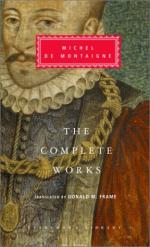
|
| Name: _________________________ | Period: ___________________ |
This test consists of 5 short answer questions, 10 short essay questions, and 1 (of 3) essay topics.
Short Answer Questions
1. What century did Montaigne live in?
2. Montaigne's father asked him to translate the unusual book discussed in Book 2 of Essays: Essay #12 into what language?
3. In Book 1 of Essays: Chapter 2, Montaigne describes how the prince of what region gained control over part of France?
4. What character trait does Montaigne say are specifically brought about by a particular treatment of children by parents?
5. What major disease hit Bordeaux while Montaigne was in office there?
Short Essay Questions
1. Why does Montaigne believe that solitude is important?
2. What unusual rule did Knights of the Spanish order that Montaigne discusses have to obey, and why?
3. What dose Montaigne say that soldiers sometimes have to resort to for survival?
4. What factors in Europe tended to restrict the social status of women?
5. Why does Montaigne believe it is possible to laugh and cry about the same thing?
6. What does Montaigne say about marriage near the end of Book 2 of Essays: Chapter 5?
7. What is Montaigne's opinion on evil means used for a good end?
8. What is Montaigne's opinion of war horses in general?
9. What does Montaigne says about the equality of vices?
10. What was the goal of the social experiment that Montaigne describes near the end of Book 2 of Essays: Chapter 8?
Essay Topics
Write an essay for ONE of the following topics:
Essay Topic 1
Feudalism was the dominant political doctrine in Europe in Montaigne's time, and the complex systems of interrelated heirarchies and social responsbilities affect his life and his writings greatly.
1) Explain the Feudal system as it existed in France at Montaigne's time. Explain its hierarchal system, and how is distributed political power. Explain some of the reasons that this system was so widespread and entrenched, and some of the unusual political situations that arose from it.
2) Discuss Montaigne's place in the Feudal system, and why he was promoted to mayor of Bordeaux late in his life. Explain some of the impact that this system had on his life and writings.
3) Assess what Montaigne's opinion of the system was overall, did he approve or disapprove of it, how and why?
Essay Topic 2
Montaigne believes in the reality of objective truth, ideas that exist in a perfect state, without the need for human interpretation. He believes that although he, and all other humans, are imperfect interpreters of these truths, they cannot be diminished or tarnished in any way by human failings.
1) Discuss the concept of truth that Montaigne articulates in his essays. How are truths understood and derived, and where do they come from? How do human beings interact with the truth?
2) Montaigne suggests that he may contradict himself from time to time. Discuss one example of this, and describe how Montaigne might explain his mistake. How would he justify the perfection of the truth he was attempting to express in the face of this contradiction?
3) Discuss the importance of the concept of objective truth in some of Montaigne's other philosophies. How does it relate to these other ideas, and how are his arguments bolstered by a reliance on objective truth?
Essay Topic 3
In one of his essays, Montaigne discusses the act of using evil means to achieve goods ends. His opinion on this subject is nuanced and impartial.
1) Discuss, using Montaigne's examples, the major philosophical points that come into play when discussing the justification of evil means for achieving good ends.
2) Summarize Montaigne's opinion on the subject, discussing whether or not justifications can be made in certain circumstances, and what moral weight these types of actions carry.
3) Analyze Montaigne's other writings and journals and asses whether or not Montaigne appears to be consistent in his own life n the application of the recommendations he makes in his essay about using evil means for good ends. Does he sometimes break his own rules, or does he generally adhere to them?
|
This section contains 888 words (approx. 3 pages at 300 words per page) |

|




